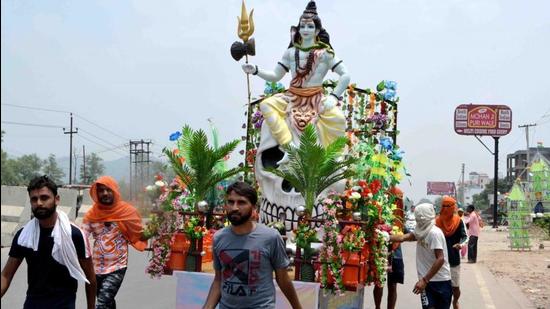Uttarakhand scraps Kanwar yatra amid warnings over 3rd Covid wave
The hill state also turned down a request from Uttar Pradesh, which allowed the pilgrimage — where Shiva devotees travel on foot or cycle to fetch water from the Ganga to their village shrines — to begin from July 25.
Uttarakhand scrapped the kanwar yatra on Tuesday, heeding warnings from health experts who cautioned that millions of devotees thronging the banks of the Ganga in Haridwar could spark a devastating third wave of Covid-19 infections and seed clusters of cases across north India.

The hill state also turned down a request from Uttar Pradesh, which allowed the pilgrimage — where Shiva devotees travel on foot or cycle to fetch water from the Ganga to their village shrines — to begin from July 25.
“We don’t want to make Haridwar the centre of Covid. People’s lives are our first priority,” said chief minister Pushkar Singh Dhami. The crucial move, which was welcomed by experts, came at a meeting chaired by Dhami on Tuesday evening.
On July 6, the hill state had decided to stop all kanwar devotees from entering the state, but decided to review its decision two days later after Uttar Pradesh chief minister Yogi Adityanath called Dhami. Both the states go to the polls in early 2022.
“We held meetings with officials of the neighbouring states. And it was concluded that at a time when we are battling the Covid epidemic and delta plus variant has been reported in the state, we don’t want the yatra held. We can’t play with the lives of people…even God won’t feel good if someone loses a life,” said Dhami.
Despite the cancellation, however, Uttar Pradesh said it will go ahead with the mega religious pilgrimage. “It’s status quo in UP. We are talking to Kanwar sanghs and everything will be done within Covid protocol,” said additional chief secretary (home) Awanish Kumar Awasthi.
The decision came after sharp opposition by doctors who warned that the impact of the kanwar yatra – which attracted 36 million pilgrims in 2019, the last year it was held – could be worse than the Mahakumbh, which was also held in Haridwar this year and sparked infections in many parts of northern India.
They said that implementing testing and masking protocol will be challenging at the kanwar yatra where pilgrims walk or cycle hundreds of kilometers through several states and hail from 10 separate states. They also held up the example of the Mahakumbh, which was visited by 9.1 million devotees and saw widespread violation of Covid norms and a failure of health infrastructure, leading to 100,000 fake rapid antigen tests conducted during the event.
“It could have been very dangerous if the pilgrimage of this magnitude had been allowed at this crucial juncture between slowing down of the second wave and the country being on the brink of the third wave,” said Dr Sanjay Shah, vice-president of the Association of Physicians of India, Uttarakhand chapter.
Ashok Kumar, Uttarakhand’s director general of police, who was present in Dhami’s meeting, said the police will now secure Haridwar from Wednesday to stop any devotee from entering the district. “However, as it was decided earlier in a meeting with the officers of police departments of neighbouring states, water tankers would be allowed to come to Haridwar to fetch the holy water at police station level to take it back for the devotees in villages in neighbouring states,” he said. These tankers are likely to be used in UP and other states to complete the yatra.
Experts said Uttarakhand’s decision was partly due to the sharp criticism from the Uttarakhand high court on the move to allow the Mahakumbh and Char Dham Yatra. On June 23, the high court called holding the kumbh a mistake, and on June 28, cancelled the Char Dham yatra, a pilgrimage of the holy sites of Yamunotri, Gangotri, Kedarnath and Badrinath that attracted 3.2 million devotees in 2019.
Dushyant Mainali, one of the lawyers who raised Covid violations in the high court, said the judges on June 23 made their opposition to mega events clear when they said “large gathering invariably leads to a spike in the Covid-19 pandemic”. “This Court is of the firm opinion that a catastrophe like Covid-19 pandemic should not be re-invited by holding and permitting large gathering at religious shrines,” the court held, indicating that it would come down heavily on future religious events as well.






